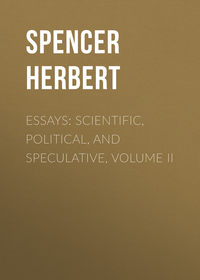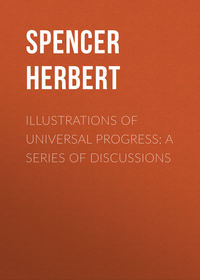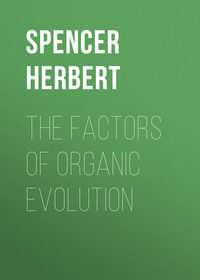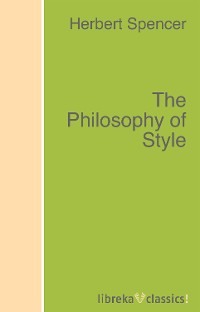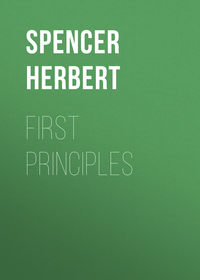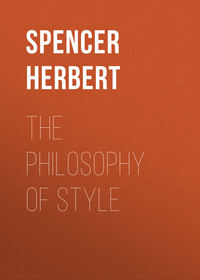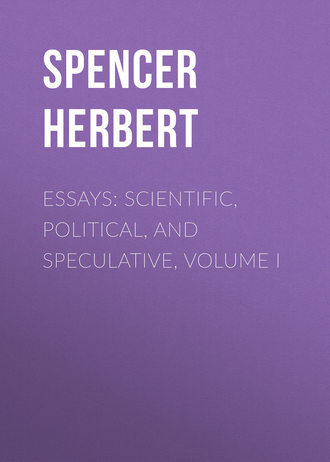 полная версия
полная версияEssays: Scientific, Political, and Speculative, Volume I
1. Imitativeness.– One of the characteristics in which the lower types of men show us a smaller departure from reflex action than do the higher types, is their strong tendency to mimic the motions and sounds made by others – an almost involuntary habit which travellers find it difficult to check. This meaningless repetition, which seems to imply that the idea of an observed action cannot be framed in the mind of the observer without tending forthwith to discharge itself in the action conceived (and every ideal action is a nascent form of the consciousness accompanying performance of such action), evidently diverges but little from the automatic; and decrease of it is to be expected along with increase of self-regulating power. This trait of automatic mimicry is evidently allied with that less automatic mimicry which shows itself in greater persistence of customs. For customs adopted by each generation from the last without thought or inquiry, imply a tendency to imitate which overmasters critical and sceptical tendencies: so maintaining habits for which no reasons can be given. The decrease of this irrational mimicry, strongest in the lowest savage and feeblest in the highest of the civilized, should be studied along with the successively higher stages of social life, as being at once an aid and a hindrance to civilization: an aid in so far as it gives that fixity to the social organization without which a society cannot survive; a hindrance in so far as it offers resistance to changes of social organization that have become desirable.
2. Incuriosity.– Projecting our own natures into the circumstances of the savage, we imagine ourselves as marvelling greatly on first seeing the products and appliances of civilized life. But we err in supposing that the savage has feelings such as we should have in his place. Want of rational curiosity respecting these incomprehensible novelties, is a trait remarked of the lowest races wherever found; and the partially-civilized races are distinguished from them as exhibiting rational curiosity. The relation of this trait to the intellectual nature, to the emotional nature, and to the social state, should be studied.
3. Quality of thought.– Under this vague head may be placed many sets of inquiries, each of them extensive – (a) The degree of generality of the ideas; (b) the degree of abstractness of the ideas; (c) the degree of definiteness of the ideas; (d) the degree of coherence of the ideas; (e) the extent to which there have been developed such notions as those of class, of cause, of uniformity, of law, of truth. Many conceptions which have become so familiar to us that we assume them to be the common property of all minds, are no more possessed by the lowest savages than they are by our own children; and comparisons of types should be so made as to elucidate the processes by which such conceptions are reached. The development under each head has to be observed – (a) independently in its successive stages; (b) in connexion with the co-operative intellectual conceptions; (c) in connexion with the progress of language, of the arts, and of social organization. Already linguistic phenomena have been used in aid of such inquiries; and more systematic use of them should be made. Not only the number of general words, and the number of abstract words, in a people's vocabulary should be taken as evidence, but also their degrees of generality and abstractness; for there are generalities of the first, second, third, &c., orders, and abstractions similarly ascending. Blue is an abstraction referring to one class of impressions derived from visible objects; colour is a higher abstraction referring to many such classes of visual impressions; property is a still higher abstraction referring to classes of impressions received not through the eyes alone, but through other sense-organs. If generalities and abstractions were arranged in the order of their extensiveness and in the order of their grades, tests would be obtained which, applied to the vocabularies of the uncivilized, would yield definite evidence of the intellectual stages reached.
4. Peculiar aptitudes.– To such specialities of intelligence as mark different degrees of evolution, have to be added minor ones related to modes of life: the kinds and degrees of faculty which have become organized in adaptation to daily habits – skill in the use of weapons, powers of tracking, quick discrimination of individual objects. And under this head may fitly come inquiries concerning some race-peculiarities of the æsthetic class, not at present explicable. While the remains from the Dordogne caves show us that their inhabitants, low as we must suppose them to have been, could represent animals, both by drawing and carving, with some degree of fidelity; there are existing races, probably higher in other respects, who seem scarcely capable of recognizing pictorial representations. Similarly with the musical faculty. Almost or quite wanting in some inferior races, we find it in other races not of high grade, developed to an unexpected degree: instance the Negroes, some of whom are so innately musical, that, as I have been told by a missionary among them, the children in native schools when taught European psalm-tunes, spontaneously sing seconds to them. Whether any causes can be discovered for race peculiarities of this kind, is a question of interest.
5. Specialities of emotional nature.– These are worthy of careful study, as being intimately related to social phenomena – to the possibility of social progress, and to the nature of the social structure. Among others to be noted there are – (a) Gregariousness or sociality – a trait in the strength of which races differ widely: some, as the Mantras, being almost indifferent to social intercourse; some being unable to dispense with it. Obviously the degree of this desire for the presence of fellow-men, affects greatly the formation of social groups, and consequently influences social progress. (b) Intolerance of restraint. Men of some inferior types, as the Mapuché, are ungovernable; while those of other types, no higher in grade, not only submit to restraint, but admire the persons exercising it. These contrasted natures have to be observed in connexion with social evolution; to the early stages of which they are respectively antagonistic and favourable. (c) The desire for praise is a trait which, common to all races, high and low, varies considerably in degree. There are quite inferior races, as some of those in the Pacific States, whose members sacrifice without stint to gain the applause which lavish generosity brings; while, elsewhere, applause is sought with less eagerness. Notice should be taken of the connexion between this love of approbation and the social restraints; since it plays an important part in the maintenance of them. (d) The acquisitive propensity. This, too, is a character the degrees of which, and the relations of which to the social state, have to be especially noted. The desire for property grows along with the possibility of gratifying it; and this, extremely small among the lowest men, increases as social development goes on. With the advance from tribal property to family property and individual property, the notion of private right of possession gains definiteness, and the love of acquisition strengthens. Each step towards an orderly social state makes larger accumulations possible, and the pleasures achievable by them more sure; while the resulting encouragement to accumulate, leads to increase of capital and to further progress. This action and re-action of the sentiment and the social state, should be in every case observed.
6. The altruistic sentiments.– Coming last, these are also highest. The evolution of them in the course of civilization, shows us clearly the reciprocal influences of the social unit and the social organism. On the one hand, there can be no sympathy, nor any of the sentiments which sympathy generates, unless there are fellow-beings around. On the other hand, maintenance of union with fellow-beings depends in part on the presence of sympathy, and the resulting restraints on conduct. Gregariousness or sociality favours the growth of sympathy; increased sympathy conduces to closer sociality and a more stable social state; and so, continuously, each increment of the one makes possible a further increment of the other. Comparisons of the altruistic sentiments resulting from sympathy, as exhibited in different types of men and different social states, may be conveniently arranged under three heads – (a) Pity, which should be observed as displayed towards offspring, towards the sick and aged, and towards enemies. (b) Generosity (duly discriminated from the love of display) as shown in giving; as shown in the relinquishment of pleasures for the sake of others; as shown by active efforts on others' behalf. The manifestations of this sentiment, too, are to be noted in respect of their range – whether they are limited to relatives; whether they extend only to those of the same society; whether they extend to those of other societies; and they are also to be noted in connexion with the degree of providence – whether they result from sudden impulses obeyed without counting the cost, or go along with clear foresight of the future sacrifices entailed. (c) Justice. This most abstract of the altruistic sentiments is to be considered under aspects like those just named, as well as under many other aspects – how far it is shown in regard to the lives of others; how far in regard to their freedom; how far in regard to their property; how far in regard to their various minor claims. And comparisons concerning this highest sentiment should, beyond all others, be carried on along with comparisons of the accompanying social states, which it largely determines – the forms and actions of governments; the characters of laws; the relations of classes.
Such, stated as briefly as consists with clearness, are the leading divisions and subdivisions under which the Comparative Psychology of Man may be arranged. In going rapidly over so wide a field, I have doubtless overlooked much that should be included. Doubtless, too, various of the inquiries named will branch out into subordinate inquiries well worth pursuing. Even as it is, however, the programme is extensive enough to occupy numerous investigators, who may with advantage take separate divisions.
Though, after occupying themselves with primitive arts and products, anthropologists have devoted their attention mainly to the physical characters of the human races; it must, I think, be admitted that the study of these yields in importance to the study of their psychical characters. The general conclusions to which the first set of inquiries may lead, cannot so much affect our views respecting the highest classes of phenomena as can the general conclusions to which the second set may lead. A true theory of the human mind vitally concerns us; and systematic comparisons of human minds, differing in their kinds and grades, will help us in forming a true theory. Knowledge of the reciprocal relations between the characters of men and the characters of the societies they form, must influence profoundly our ideas of political arrangements. When the inter-dependence of individual natures and social structures is understood, our conceptions of the changes now taking place, and hereafter to take place, will be rectified. A comprehension of mental development as a process of adaptation to social conditions, which are continually remoulding the mind and are again remoulded by it, will conduce to a salutary consciousness of the remoter effects produced by institutions upon character; and will check the grave mischiefs which ignorant legislation now causes. Lastly, a right theory of mental evolution as exhibited by humanity at large, giving a key, as it does, to the evolution of the individual mind, must help to rationalize our perverse methods of education; and so to raise intellectual power and moral nature.
MR. MARTINEAU ON EVOLUTION
[First published in The Contemporary Review, for June, 1872.]
The article by Mr. Martineau, in the April number of the Contemporary Review, on "The Place of Mind in Nature, and Intuition of Man," recalled to me a partially-formed intention to deal with the chief criticisms which have from time to time been made on the general doctrine set forth in First Principles; since, though not avowedly directed against propositions asserted or implied in that work, Mr. Martineau's reasoning tells against them by implication. The fulfilment of this intention I should, however, have continued to postpone, had I not learned that the arguments of Mr. Martineau are supposed by many to be conclusive, and that, in the absence of replies, it will be assumed that no replies can be made. It seems desirable, therefore, to notice these arguments at once – especially as the essential ones may, I think, be effectually dealt with in a comparatively small space.
The first definite objection which Mr. Martineau raises is, that the hypothesis of General Evolution is powerless to account even for the simpler orders of facts in the absence of numerous different substances. He argues that were matter all of one kind, no such phenomena as chemical changes would be possible; and that, "in order to start the world on its chemical career, you must enlarge its capital and present it with an outfit of heterogeneous constituents. Try, therefore, the effect of such a gift; fling into the pre-existing cauldron the whole list of recognized elementary substances, and give leave to their affinities to work." The intended implication obviously is, that there must exist the separately-created elements before evolution can begin.
Here, however, Mr. Martineau makes an assumption which few, if any, chemists will commit themselves to, and which many will distinctly deny. There are no "recognized elementary substances," if the expression means substances known to be elementary. What chemists, for convenience, call elementary substances, are merely substances which they have thus far failed to decompose; but, bearing in mind past experiences, they do not dare to say that they are absolutely undecomposable. Water was taken to be an element for more than two thousand years, and then was proved to be a compound; and, until Davy brought a galvanic current to bear upon them, the alkalies and the earths were supposed to be elements. So little true is it that "recognized elementary substances" are supposed to be absolutely elementary, that there has been much speculation among chemists respecting the process of compounding and recompounding by which they have been formed out of some ultimate substance – some chemists having supposed the atom of hydrogen to be the unit of composition, but others having contended that the atomic weights of the so-called elements are not thus interpretable. If I remember rightly, Sir John Herschel was one, among others, who, some five-and-twenty years ago, threw out suggestions respecting a system of compounding that might explain these relations of the atomic weights.
What was at that time a suspicion has now become practically a certainty. Spectrum-analysis yields results wholly irreconcilable with the assumption that the conventionally-named simple substances are really simple. Each yields a spectrum having lines varying in number from two to eighty or more, every one of which implies the intercepting of ethereal undulations of a certain order by something oscillating in unison or in harmony with them. Were iron absolutely elementary, it is not conceivable that its atom could intercept ethereal undulations of eighty different orders. Though it does not follow that its molecule contains as many separate atoms as there are lines in its spectrum, it must clearly be a complex molecule. The evidence thus gained points to the conclusion that, out of some primordial units, the so-called elements arise by compounding and recompounding; just as by the compounding and recompounding of so-called elements there arise oxides, and acids, and salts.
And this hypothesis is entirely in harmony with the phenomena of allotropy. Various substances, conventionally distinguished as simple, have several forms under which they present quite different properties. The semi-transparent, colourless, extremely active substance called phosphorus may be so changed as to become opaque, dark red, and inert. Like changes are known to occur in some gaseous, non-metallic elements, as oxygen; and also in metallic elements, as antimony. These total changes of properties, brought about without any changes to be called chemical, are interpretable only as due to molecular rearrangements; and, by showing that difference of property is producible by difference of arrangement, they support the inference otherwise to be drawn, that the properties of different elements result from differences of arrangement arising by the compounding and recompounding of ultimate homogeneous units.
Thus Mr. Martineau's objection, which at best would imply a turning of our ignorance of the nature of elements into positive knowledge that they are simple, is, in fact, to be met by two sets of evidences, which imply that they are compound.
Mr. Martineau next alleges that a fatal difficulty is put in the way of the General Doctrine of Evolution by the existence of a chasm between the living and the not-living. He says: – "But with all your enlargement of data, turn them as you will, at the end of every passage which they explore, the door of life is closed against them still." Here again our ignorance is employed to play the part of knowledge. The fact that we do not know distinctly how an alleged transition has taken place, is transformed into the assumption that no transition has taken place. We have, in a more general shape, the argument which until lately was thought conclusive – the argument that because the genesis of each species of creature had not been explained, therefore each species must have been separately created.
Merely noting this, however, I go on to remark that scientific discovery is day by day narrowing the chasm, or, to vary Mr. Martineau's metaphor, "opening the door." Not many years since, it was held as certain that the chemical compounds distinguished as organic could not be formed artificially. Now, more than a thousand organic compounds have been formed artificially. Chemists have discovered the art of building them up from the simpler to the more complex, and do not doubt that they will eventually produce the most complex. Moreover, the phenomena attending isomeric change give a clue to those movements which are the only indications we have of life in its lowest forms. In various colloidal substances, including the albuminoid, isomeric change is accompanied by contraction or expansion, and consequent motion; and, in such primordial types as the Protogenes of Haeckel, which do not differ in appearance from minute portions of albumen, the observed motions are comprehensible as accompanying isomeric changes caused by variations in surrounding physical actions. The probability of this interpretation will be seen on remembering the evidence we have that, in the higher organisms, many functions are essentially effected by isomeric changes from one to another of the multitudinous forms which protein assumes.
Thus the reply to this objection is, first, that there is going on from both sides a narrowing of the chasm supposed to be impassable; and, secondly, that, even were the chasm not in course of being filled up, we should no more be justified in therefore assuming a supernatural commencement of life, than Kepler was justified in assuming that there were guiding-spirits to keep the planets in their orbits, because he could not see how else they were to be kept in their orbits.
The third definite objection made by Mr. Martineau is of kindred nature. The Hypothesis of Evolution is, he thinks, met by the insurmountable difficulty that plant life and animal life are absolutely distinct. "You cannot," he says, "take a single step toward the deduction of sensation and thought: neither at the upper limit do the highest plants (the exogens) transcend themselves and overbalance into animal existence; nor at the lower, grope as you may among the sea-weeds and sponges, can you persuade the sporules of the one to develop into the other."
This is an extremely unfortunate objection to raise. For, though there are no transitions from vegetal to animal life at the places Mr. Martineau names, where, indeed, no biologist would look for them; yet the connexion between the two great kingdoms of living things is so complete that separation is now regarded as impossible. For a long time naturalists endeavored to frame definitions such as would, the one include all plants and exclude all animals, and the other include all animals and exclude all plants. But they have been so repeatedly foiled in the attempt that they have given it up. There is no chemical distinction which holds; there is no structural distinction which holds; there is no functional distinction which holds; there is no distinction as to mode of existence which holds. Large groups of the simpler animals contain chlorophyll, and decompose carbonic acid under the influence of light, as plants do. Large groups of the simpler plants, as you may observe in the diatoms from any stagnant pool, are no less actively locomotive than the minute creatures classed as animals seen along with them. Nay, among these lowest types of living things, it is common for the life to be now predominantly animal and presently to become predominantly vegetal. The very name zoospores, given to germs of algæ, which for a while swim about actively by means of cilia, and presently settling down grow into plant-forms, is given because of this conspicuous community of nature. So complete is this community of nature that for some time past many naturalists have wished to establish for these lowest types a sub-kingdom, intermediate between the animal and the vegetal: the reason against this course being, however, that the difficulty crops up afresh at any assumed places where this intermediate sub-kingdom may be supposed to join the other two.
Thus the assumption on which Mr. Martineau proceeds is diametrically opposed to the conviction of naturalists in general.
Though I do not perceive that it is specifically stated, there appears to be tacitly implied a fourth difficulty of allied kind – the difficulty that there is no possibility of transition from life of the simplest kind to mind. Mr. Martineau says, indeed, that there can be "with only vital resources, as in the vegetable world, no beginning of mind: " apparently leaving it to be inferred that in the animal world the resources are such as to make the "beginning of mind" comprehensible. If, however, instead of leaving it a latent inference, he had distinctly asserted a chasm between mind and bodily life, for which there is certainly quite as much reason as for asserting a chasm between animal life and vegetal life, the difficulties in his way would have been no less insuperable.
For those lowest forms of irritability in the animal kingdom which, I suppose, Mr. Martineau refers to as the "beginning of mind," are not distinguishable from the irritability which plants display: they in no greater degree imply consciousness. If the sudden folding of a sensitive-plant's leaf when touched, or the spreading out of the stamens in a wild-cistus when gently brushed, is to be considered a vital action of a purely physical kind; then so too must be considered the equally slow contraction of a polype's tentacles. And yet, from this simple motion of an animal of low type, we may pass by insensible stages through ever-complicating forms of actions, with their accompanying signs of feeling and intelligence, until we reach the highest.
Even apart from the evidence derived from the ascending grades of animals up from zoophytes, as they are significantly named, it needs only to observe the evolution of a single animal to see that there does not exist any break or chasm between the life which shows no mind and the life which shows mind. The yelk of an egg which the cook has just broken, not only yields no sign of mind, but yields no sign of life. It does not respond to a stimulus as much even as many plants do. Had the egg, instead of being broken by the cook, been left under the hen for a certain time, the yelk would have passed by infinitesimal gradations through a series of forms ending in the chick; and by similarly infinitesimal gradations would have arisen those functions which end in the chick breaking its shell; and which, when it gets out, show themselves in running about, distinguishing and picking up food, and squeaking if hurt. When did the feeling begin? and how did there come into existence that power of perception which the chick's actions show? Should it be objected that the chick's actions are mainly automatic, I will not dwell on the fact that, though they are largely so, the chick manifestly has feeling and therefore consciousness; but I will accept the objection, and propose that instead we take the human being. The course of development before birth is just of the same general kind; and similarly, at a certain stage, begins to be accompanied by reflex movements. At birth there is displayed an amount of mind certainly not greater than that of the chick: there is no power of running from danger – no power of distinguishing and picking up food. If we say the chick is unintelligent, we must certainly say the infant is unintelligent. And yet from the unintelligence of the infant to the intelligence of the adult, there is an advance by steps so small that on no day is the amount of mind shown, appreciably different from that shown on preceding and succeeding days.


